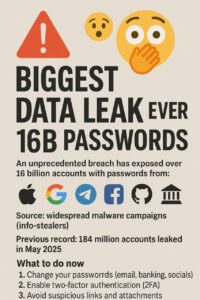An enormous security breach has just shaken the digital world — over 16 billion accounts have been compromised. This is not just a one-time slip-up; it’s a buffet of personal data laid bare. From social media sites to government portals, this leak affects millions and raises serious questions about online safety. Recently, Forbes reported on this historic event, making it clear that cyber threats are growing more dangerous every day. Understanding what happened is vital for protecting ourselves now and in the future.

The Scope of the Data Breach: What Was Leaked?
Overview of the 16 Billion Accounts
Bigger than any breach before, this leak involves a staggering 16 billion passwords and associated data. It affects a wide range of services such as Apple, Google, Telegram, Facebook, GitHub, and even government websites. The leak includes not only passwords but also email addresses and possibly other personal details. This massive volume of data makes it the largest breach in cybersecurity history.
Key Companies and Organizations Impacted
Major tech giants like Apple and Google are on the list, but so are popular social networks like Facebook and Telegram. Even GitHub, a platform used by developers, saw its data compromised. Surprisingly, some government portals that store sensitive information were affected as well. The impact shows how no organization is totally safe from a determined cyber attack.
How the Data Was Collected and Leaked
Hackers used various tools to gather this information. Many relied on malware, phishing scam emails, and hacking into different companies’ servers. It’s believed this was not just one attack but a series of breaches that eventually resulted in this enormous leak. Some data was stolen from individual breaches and combined into a single, massive database.
What Makes This Breach Unprecedented?
Comparison with Previous Major Data Leaks
For years, big breaches like Yahoo or Equifax had their moments in the spotlight. Yahoo’s leak exposed 3 billion accounts, and Equifax lost data of nearly half a million people. But none matched this event in scale — over 16 billion accounts make it the biggest of all time.
The Scope and Accessibility of the Leaked Data
This isn’t just about numbers. It’s about how easy it is for bad actors to access and use this data. The sheer volume means hackers can piece together detailed profiles of millions, opening doors for targeted scams. Civilian users, small businesses, and large organizations all face the risk of misuse. This leak surpasses previous ones because of its size and potential danger.
The Potential Risks for Users
When your passwords are exposed, anything can happen. Identity theft, account hacking, or impersonation become very real threats. Criminals could also use your email to target you with phishing scams. People affected might see their online lives disrupted, or worse, face financial loss. History shows that large breaches like this often lead to credit fraud and long-lasting privacy issues.
Expert Insights and Industry Reactions
Cybersecurity Experts’ Perspectives
Experts warn that this breach is a wake-up call. They say it exposes just how vulnerable our digital lives are. Cybersecurity specialists emphasize the importance of strong passwords, multi-factor authentication, and regular security checks. Many warn that it’s a sign we need better defenses to prevent future disasters.
Responses from Affected Companies and Governments
In the wake of the leak, companies issued statements promising to improve security. Some are rolling out better encryption methods, and others are urging users to change passwords immediately. Governments are also reviewing policies because personal data leaks threaten national security. Many are considering stricter laws to prevent such breaches from happening again.
Legal and Ethical Implications
Such a huge leak raises ethical questions about data privacy. Companies may face lawsuits if found neglecting security protocols. Governments might tighten rules around data collection and storage. It’s a reminder that safeguarding personal info isn’t just a technical issue — it’s a moral one, too.
How to Protect Yourself from the Aftermath of Such a Breach
Immediate Actions to Secure Your Accounts
If your info is part of this leak, act quickly:
- Change your passwords on all affected platforms.
- Enable two-factor authentication for extra protection.
- Use a password manager to create and save strong passwords.
Long-Term Security Strategies
Don’t just stop there. Keep monitoring your accounts regularly for suspicious activity. Never reuse passwords across different sites. Stay updated about new breaches and security tips. Upgrading your security software can also make a big difference in staying safe.
How Organizations Can Better Protect Data
Companies should encrypt sensitive info, practice security audits, and adopt a zero-trust security approach. Governments must enforce stricter rules on data privacy. Investing in new tech like AI and blockchain can help identify threats sooner and respond faster.
The Future of Data Security: Lessons Learned
Strengthening Cybersecurity Infrastructure
Protection against future breaches means building layered security systems. Think of it as multiple locks on a door — the more, the better. New innovations like AI can detect unusual activities faster, stopping attacks before they do damage.
Public Awareness and Personal Responsibility
People need to understand that their actions matter. Educate yourself about safe online habits. Don’t share passwords, never click on suspicious links, and stay alert. When everyone plays their part, the whole internet becomes safer.
Policy and Regulation Enhancements
Stronger laws and international cooperation are critical. Countries must work together to fight cybercrime. Better laws can require companies to follow stricter security standards, protecting users worldwide.
Conclusion
This breach, exposing over 16 billion accounts, is a wake-up call. It shows how vulnerable our digital world really is. Now more than ever, we must take security seriously. Change your passwords, stay informed, and demand better safeguards from companies and governments. The battle for digital safety doesn’t end here — it’s just begun. Keep your guard up, and stay vigilant in this connected world.

